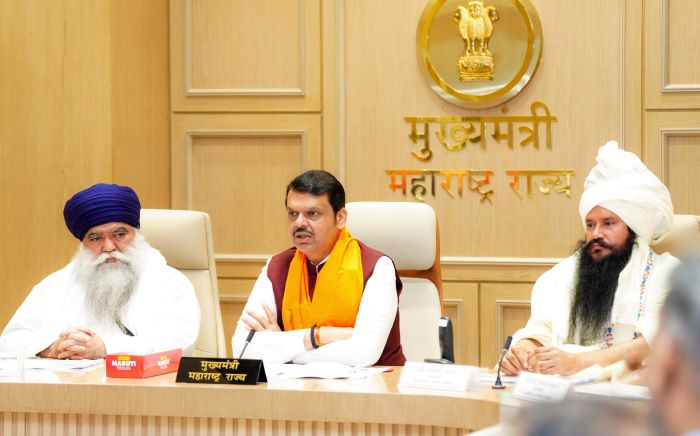 Mumbai / Amritsar-The BJP Government of Maharashtra, under the leadership of Chief Minister Shri Devendra Fadnavis, has announced the roadmap, organizing committees, and detailed programs to commemorate at the state level the 350th Shaheedi Centenary of “Hind di Chadar” Sri Guru Tegh Bahadur Sahib Ji and the 350th Gurta Gaddi Centenary of the Tenth Master, Sri Guru Gobind Singh Sahib Ji. This decision is being seen as an unparalleled recognition of the deep historical sentiments of the Sikh community and Guru Nanak Naam Leva Sangats residing in Maharashtra.
Mumbai / Amritsar-The BJP Government of Maharashtra, under the leadership of Chief Minister Shri Devendra Fadnavis, has announced the roadmap, organizing committees, and detailed programs to commemorate at the state level the 350th Shaheedi Centenary of “Hind di Chadar” Sri Guru Tegh Bahadur Sahib Ji and the 350th Gurta Gaddi Centenary of the Tenth Master, Sri Guru Gobind Singh Sahib Ji. This decision is being seen as an unparalleled recognition of the deep historical sentiments of the Sikh community and Guru Nanak Naam Leva Sangats residing in Maharashtra.
Sharing details of this historic announcement, Sardar Jaspal Singh Sidhu, Head of the Maharashtra Sikh Coordination Committee, informed that the decision was taken by accepting the proposal put forth by Sant Giani Harnam Singh Khalsa, Head of Damdami Taksal. With the approval of the Governor of Maharashtra, the State Minority Development Department issued an official notification on September 12, 2025, confirming the celebration of these two Gurpurabs with grandeur at the state level.
As per the official plan, state-level commemorations will be organized in Nanded on November 15–16, in Nagpur on December 6, and in Navi Mumbai on December 20–21. For these events, a state-level coordination committee has been constituted under the chairmanship of the Chief Minister. Alongside, local organizing committees and district-level committees have also been formed to ensure that religious, literary, cultural, and educational programs are organized successfully on a wide scale.
In this plan, Sant Giani Harnam Singh Ji Khalsa and the 11-member Sikh Coordination Committee will play a pivotal role, along with active participation from Sikh Sangats, Sikligar, Lubana, Banjara, Mohyal, and other Guru Nanak Naam Leva communities. The State Government has appointed the Chief Secretary as the Chairperson of the committee, while prominent saints, Sikh representatives, social leaders, and scholars have been included as non-official members. In addition, a special Exhibition Committee has also been constituted, which will connect people through research-based publications, audio–visual material, and awareness campaigns on the great legacy of Guru Sahiban.
Chief Minister Devendra Fadnavis stated that in 1675, Guru Tegh Bahadur Sahib Ji attained martyrdom at Chandni Chowk, Delhi, while defending religious freedom and human rights. His supreme sacrifice is not only a matter of pride and inspiration for the Sikh Panth, but also for the entire Indian society. His martyrdom conveyed to future generations the eternal message of truth, justice, and the defense of humanity. The Chief Minister also recalled the unparalleled devotion of Bhai Lakhi Shah Vanjara, who performed the cremation of Guru Sahib’s body by setting fire to his own house and caravan.
On this occasion, Sant Giani Harnam Singh Khalsa expressed heartfelt gratitude to the Maharashtra Government and Chief Minister Fadnavis Ji for honoring the historic sentiments of the Sikh community. He said that with the blessings of Guru Sahiban and the cooperation of the government and Sangat, these commemorations will become symbols of martyrdom, unity, and spiritual strength. Through these events, the Bani, teachings, and martyrdom message of Guru Tegh Bahadur Sahib Ji will be disseminated on a large scale.
Sikh Coordination Committee leader Jaspal Singh Sidhu stated that this decision of the Maharashtra Government is not only for the Sikhs but also a mark of respect for all religions and communities. These celebrations will prove to be a milestone in connecting the younger generation with their religious and cultural heritage. He added that this historic step will strengthen national unity, interfaith harmony, and the pride of shared heritage. Prime Minister Shri Narendra Modi, Home Minister Shri Amit Shah, and Uttar Pradesh Chief Minister Shri Yogi Adityanath will also grace these commemorations.
He further lauded the Fadnavis Government for granting long-denied governmental benefits to Vanjara, Lubana, and Sikligar communities by including them in the “Nomadic and De-notified Tribes” category, for introducing a special elective course on Sikh Martyrdom (1500–1765) in the state curriculum, for launching the Nanded–Mumbai Vande Bharat train service, and for the restoration of the historic Samadhi of Maharani Jinda.
Skip to content
Punjab Top New